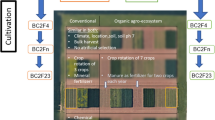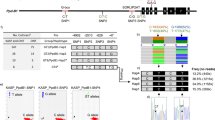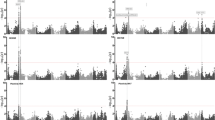Abstract
Inbreeding depression refers to the reduced performance arising from increased homozygosity, a phenomenon that is the reverse of heterosis and exists among plants and animals. As a natural self-pollinated crop with strong heterosis, the mechanism of inbreeding depression in rice is largely unknown. To understand the genetic basis of inbreeding depression, we constructed a successive inbreeding population from the F2 to F4 generation and observed inbreeding depression of all heterotic traits in the progeny along with the decay of heterozygosity in each generation. The expected depression effect was largely explained by 13 QTLs showing dominant effects for spikelets per panicle, 11 for primary branches, and 12 for secondary branches, and these loci constitute the main correlation between heterosis and inbreeding depression. However, the genetic basis of inbreeding depression is also distinct from that of heterosis, such that a biased transmission ratio of alleles for QTLs with either dominant or additive effects in four segregation distortion regions would result in minor effects in expected depression. Noticeably, two-locus interactions may change the extent and direction of the depression effects of the target loci, and overall interactions would promote inbreeding depression among generations. Using an F2:3 variation population, the actual performance of the loci showing expected depression was evaluated considering the heterozygosity decay in the background after inbreeding. We found inconsistent or various degrees of background depression from the F2 to F3 generation assuming different genotypes of the target locus, which may affect the actual depression effect of the locus due to epistasis. The results suggest that the genetic architecture of inbreeding depression and heterosis is closely linked but also differs in their intrinsic mechanisms, which expand our understanding of the whole-genome architecture of inbreeding depression.
Similar content being viewed by others
References
Alam, M.F., Khan, M.R., Nuruzzaman, M., Parvez, S., Swaraz, A.M., Alam, I., and Ahsan, N. (2004). Genetic basis of heterosis and inbreeding depression in rice (Oryza sativa L.). J Zheijang Univ Sci 5, 406–411.
Armbruster, P., and Reed, D.H. (2005). Inbreeding depression in benign and stressful environments. Heredity 95, 235–242.
Becher, H., Jackson, B.C., and Charlesworth, B. (2020). Patterns of genetic variability in genomic regions with low rates of recombination. Curr Biol 30, 94–100.e3.
Botelho, F.B.S., Bruzi, A.T., Lima, I.P., Rodrigues, C.S., and de C. Botelho, R.T. (2016). Inbreeding depression in single, three way and double-cross hybrids of maize. Genet Mol Res 15, 1–7.
Byers, D.L., and Waller, D.M. (1999). Do plant populations purge their genetic load? Effects of population size and mating history on inbreeding depression. Annu Rev Ecol Syst 30, 479–513.
Charlesworth, B., Charlesworth, D., and Morgan, M.T. (1990). Genetic loads and estimates of mutation rates in highly inbred plant populations. Nature 347, 380–382.
Charlesworth, D., and Charlesworth, B. (1987). Inbreeding depression and its evolutionary consequences. Annu Rev Ecol Syst 18, 237–268.
Charlesworth, D., and Willis, J.H. (2009). The genetics of inbreeding depression. Nat Rev Genet 10, 783–796.
Chen, Z.J. (2013). Genomic and epigenetic insights into the molecular bases of heterosis. Nat Rev Genet 14, 471–482.
Cheng, S.H., Zhuang, J.Y., Fan, Y.Y., Du, J.H., and Cao, L.Y. (2007). Progress in research and development on hybrid rice: a super-domesticate in China. Ann Bot 100, 959–966.
Darwin, C.R. (1876). The Effects of Cross and Self Fertilisation in the Vegetable Kingdom. London: John Murray.
Fishman, L. (2001). Inbreeding depression in two populations of Arenaria uniflora (Caryophyllaceae) with contrasting mating systems. Heredity 86, 184–194.
Fox, C.W., and Reed, D.H. (2011). Inbreeding depression increases with environmental stress: an experimental study and meta-analysis. Evolution 65, 246–258.
Gilbert, K.J., Pouyet, F., Excoffier, L., and Peischl, S. (2020). Transition from background selection to associative overdominance promotes diversity in regions of low recombination. Curr Biol 30, 101–107.e3.
Hedrick, P.W., and Garcia-Dorado, A. (2016). Understanding inbreeding depression, purging, and genetic rescue. Trends Ecol Evol 31, 940–952.
Hedrick, P.W., and Kalinowski, S.T. (2000). Inbreeding depression in conservation biology. Annu Rev Ecol Syst 31, 139–162.
Hua, J., Xing, Y., Wu, W., Xu, C., Sun, X., Yu, S., and Zhang, Q. (2003). Single-locus heterotic effects and dominance by dominance interactions can adequately explain the genetic basis of heterosis in an elite rice hybrid. Proc Natl Acad Sci USA 100, 2574–2579.
Hua, J.P., Xing, Y.Z., Xu, C.G., Sun, X.L., Yu, S.B., and Zhang, Q. (2002). Genetic dissection of an elite rice hybrid revealed that heterozygotes are not always advantageous for performance. Genetics 162, 1885–1895.
Huang, X., Yang, S., Gong, J., Zhao, Q., Feng, Q., Zhan, Q., Zhao, Y., Li, W., Cheng, B., Xia, J., et al. (2016). Genomic architecture of heterosis for yield traits in rice. Nature 537, 629–633.
Huang, X., Yang, S., Gong, J., Zhao, Y., Feng, Q., Gong, H., Li, W., Zhan, Q., Cheng, B., Xia, J., et al. (2015). Genomic analysis of hybrid rice varieties reveals numerous superior alleles that contribute to heterosis. Nat Commun 6, 6258–6266.
Jones, D.F. (1939). Continued inbreeding in maize. Genetics 24, 462–473.
Lande, R., and Schemske, D.W. (1985). The evolution of self-fertilization and inbreeding depression in plants. I. Genetic models. Evolution 39, 24–40.
Li, Z.K., Luo, L.J., Mei, H.W., Wang, D.L., Shu, Q.Y., Tabien, R., Zhong, D.B., Ying, C. S., Stansel, J.W., Khush, G.S., et al. (2001). Overdominant epistatic loci are the primary genetic basis of inbreeding depression and heterosis in rice. I. Biomass and grain yield. Genetics 158, 1737–1753.
Mackay, I.J., Cockram, J., Howell, P., and Powell, W. (2021). Understanding the classics: the unifying concepts of transgressive segregation, inbreeding depression and heterosis and their central relevance for crop breeding. Plant Biotechnol J 19, 26–34.
McMullen, M.D., Kresovich, S., Villeda, H.S., Bradbury, P., Li, H., Sun, Q., Flint-Garcia, S., Thornsberry, J., Acharya, C., Bottoms, C., et al. (2009). Genetic properties of the maize nested association mapping population. Science 325, 737–740.
Ouyang, Y., Li, X., and Zhang, Q. (2022). Understanding the genetic and molecular constitutions of heterosis for developing hybrid rice. J Genet Genomics 49, 385–393.
Remington, D.L., and O’Malley, D.M. (2000). Evaluation of major genetic loci contributing to inbreeding depression for survival and early growth in a selfed family of Pinus taeda. Evolution 54, 1580–1589.
Samayoa, L.F., Olukolu, B.A., Yang, C.J., Chen, Q., Stetter, M.G., York, A.M., Sanchez-Gonzalez, J.J., Glaubitz, J.C., Bradbury, P.J., Romay, M.C., et al. (2021). Domestication reshaped the genetic basis of inbreeding depression in a maize landrace compared to its wild relative, teosinte. PLoS Genet 17, e1009797.
Schnable, P.S., and Springer, N.M. (2013). Progress toward understanding heterosis in crop plants. Annu Rev Plant Biol 64, 71–88.
Wing, R.A., Purugganan, M.D., and Zhang, Q. (2018). The rice genome revolution: from an ancient grain to Green Super Rice. Nat Rev Genet 19, 505–517.
Yao, H., Srivastava, S., Swyers, N., Han, F., Doerge, R.W., and Birchler, J.A. (2020). Inbreeding depression in genotypically matched diploid and tetraploid maize. Front Genet 11, 564928.
Yengo, L., Yang, J., Keller, M.C., Goddard, M.E., Wray, N.R., and Visscher, P.M. (2021). Genomic partitioning of inbreeding depression in humans. Am J Hum Genet 108, 1488–1501.
Yu, S.B., Li, J.X., Xu, C.G., Tan, Y.F., Gao, Y.J., Li, X.H., Zhang, Q., and Maroof, M.A.S. (1997). Importance of epistasis as the genetic basis of heterosis in an elite rice hybrid. Proc Natl Acad Sci USA 94, 9226–9231.
Yun, L., and Agrawal, A.F. (2014). Variation in the strength of inbreeding depression across environments: effects of stress and density dependence. Evolution 68, 3599–3606.
Zhang, C., Wang, P., Tang, D., Yang, Z., Lu, F., Qi, J., Tawari, N.R., Shang, Y., Li, C., and Huang, S. (2019). The genetic basis of inbreeding depression in potato. Nat Genet 51, 374–378.
Zhang, J., Chen, L.L., Xing, F., Kudrna, D.A., Yao, W., Copetti, D., Mu, T., Li, W., Song, J.M., Xie, W., et al. (2016). Extensive sequence divergence between the reference genomes of two elite indica rice varieties Zhenshan 97 and Minghui 63. Proc Natl Acad Sci USA 113, E5163–E5171.
Zhou, G., Chen, Y., Yao, W., Zhang, C., Xie, W., Hua, J., Xing, Y., Xiao, J., and Zhang, Q. (2012). Genetic composition of yield heterosis in an elite rice hybrid. Proc Natl Acad Sci USA 109, 15847–15852.
Acknowledgement
This work was supported by the National Key Research and Development Program of China (2022YFF1002100), the National Natural Science Foundation of China (31991223, 32341031, 32170622, 31821005), the Hubei Key R&D Program (2020BBA034), the Hubei Key R&D Program in Hongshan Lab (2021hszd005, 2022hszd017), and the Fundamental Research Founds for the Central Universities (2662023PY002). The total RNA data was sequenced on the high-throughput sequencing platform, part of phenotyping was performed on the crop phenotyping platform, and the computations were run on the bioinformatics computing platform (all the three platforms are housed in the National Key Laboratory of Crop Genetic Improvement, Huazhong Agricultural University).
Author information
Authors and Affiliations
Corresponding author
Ethics declarations
The author(s) declare that they have no conflict of interest.
Supporting Informations
Rights and permissions
About this article
Cite this article
Xu, X., Xu, Y., Che, J. et al. The genetic basis and process of inbreeding depression in an elite hybrid rice. Sci. China Life Sci. (2024). https://doi.org/10.1007/s11427-023-2547-2
Received:
Accepted:
Published:
DOI: https://doi.org/10.1007/s11427-023-2547-2




